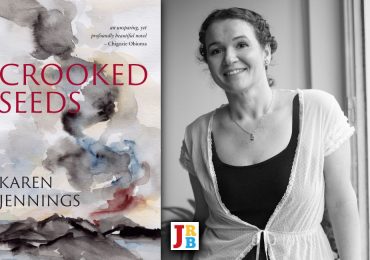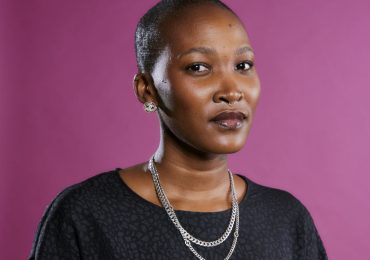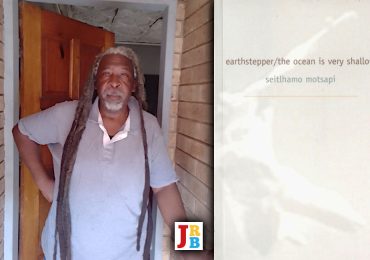K Sello Duiker emerged on the African literary scene with a visceral two-punch combo, the novels Thirteen Cents (2000) and The Quiet Violence of Dreams (2001), which garnered him acclaim as ‘the most exciting young voice’ to emerge in post-apartheid literature at the time. Duiker took his life in 2005; his unfinished work The Hidden Star was published a year later. On 13 April this year, he would have turned forty-five. His writing pal Bongani Madondo fields questions about Duiker, mental health and creativity from the writer Rofhiwa Maneta.
Brothers and Keepers—John Edgar Wideman
Once We Were Brothers—Ronald H Balson
On 19 January 2005, award-winning author Kabelo Sello Duiker took his life in at his Northcliff, Johannesburg home. Duiker, who had been living with bipolar affective disorder, was reported to have been going through a depressive episode at the time. He had stopped taking his mood stabilising medication, which he felt was ‘taking too great a toll on his artistic creativity and joie de vivre’.
His magnum opus, The Quiet Violence of Dreams, is a discomforting story about Tshepo, a journalism student who finds himself at odds with his sanity after being admitted to a psychiatric hospital for cannabis-induced psychosis. Rendered with a layered lyrical prose, the book is also regarded as a semi-autobiographical account of Duiker’s time in Cape Town, a city that seemingly eats its young Black authors.
The parallels are so thinly veiled, they may as well not exist. But if Kabelo was Tshepo and Tshepo was Kabelo, The Quiet Violence of Dreams reads not just a major literary text, but a gut-wrenching shout into the void. If Duiker was crying out for help, were any of us really listening?
Rofhiwa Maneta for The JRB: How did you and Sello first meet?
Bongani Madondo: Kabelo, which is how he preferred to be known, at least by people in his ‘community’, and I met in the year 2000. The occasion is still vivid in my head. It was quite a heady and pulpy moment. The entire country was riding the crest of Thabo Mbeki’s ‘I Am an African’ speech. We met at a poetry show featuring probably the most sublime theatrical poetry outfit I’ve seen in this country then and since, going by the name When Poetry is Black at the Windybrow Theatre in downtown Hillbrow. The ice-breaker was that both of us had eyes on the young woman who was the centre and philosophical pillar of the poetry trio. She was magnetic, eloquent, her voice as spine-chilling as it was magical. Kabelo had on a fresh, clean, white tank top and wore a spiky Don King-esque Afro. He was utterly beautiful and relaxed, and exuded a welcoming, magnetically intelligent energy, if energy can be so read. I was an out-of-work journalist and a closeted poet, experimenting in subversive storytelling, free from print media’s prohibitive editorial and style police. We were young and restless. He was twenty-six and I had just turned thirty. We were drawn to each other mainly because we were so different and yet so alike—in ways we never cared to admit. The glue though was that we both loved literature, had both worked in the newsroom, both wrote short fiction and had brief dalliances in the advertising world, his being much longer than mine—I lasted exactly one day before I fled from that world. We also both wrote poetry and in fact soon entered into an idealistic pact that we should work at altering both the literary and media landscapes with writing and story subjects not experienced before. Oopsy! Chalk that up to youth. But maybe not so fast, because indeed K Sello Duiker did go on to alter the game, in the manner that someone like Phaswane Mpe also did, in his very brief time in publishing. If I was dismissive yet ambitious and Phaswane withdrawn and contemplative (he was an academic and never hung out on the streets as much as we did, or if he did, he was possibly a lone ranger); Kabelo hung between being boisterous, generous and genial, all the while playing down his equally fierce and driven competitiveness. I must say the space was teeming with talent. There was Zachariah Rapola, John Matshikiza was looking for Mr Madini, theatre spaces were exploding with talent, spoken poetry created ‘slam’ philosophers riding verse and haiku alike, ‘dropping science’ on the philistines, journalism was a bit edgy, and so on. Still, I am not so thoroughly naive as to imagine we were in the grip of an artistic renaissance.
Soon after settling into a kind of ink-boys duo familiarity Kabelo and I also discovered a mutual literary and personal crush on the writer Zadie Smith. If the poetry ‘sister’ spat black consciousness that would now be dismissed as ‘Hotepian’, Smith was something to behold, and yet remote, unreal, a dream. North London-based, freckled, head wrapped in nineteen-seventies ‘Harari’ turbans, nerdy, and seemingly wise beyond her time on this earth, she wrote with a plain, almost too plain, beauty that left the reader hungry for more. Kabelo won the draw, became famous, won prizes, and met our Zadie. He might have lied for all I know, but I’ve never forgiven him for ‘meeting’ her and will never do so.
The JRB: What do you remember most about Kabelo?
Bongani Madondo: His silence and madness—meaning his beautiful eccentricity, singularity even. I remember his laughter and how we finished each other’s sentences. He was my doppelganger (although he was five years younger than me). He was a reader. He got me into Ben Okri and I got him into African spirituality and magical realism.
He was always stronger than me and assured me that we would become major writers and make films. He loved his aunt with whom he lived in Berea. He worked on large chunks of The Quiet Violence of Dreams at his aunt’s place, as well as at my apartment, 20 Olympia Mansions on Yeo Street, Y’ville. I had the fool’s fortune of reading it as a work-in-progress, which is rare because writers, at least this writer, are not in the habit of sharing their works before they’re done. To this day I cannot bring myself to read it as a finished book, if you know what I mean.
The JRB: How did Kabelo relate to himself as an artist? He’s been painted as a rare yet neurotic talent since his passing.
Bongani Madondo: Which writer is not neurotic? I need to say this though: I believe no person is wholly what they reveal themselves to be to others at all moments, so I’m speaking here of the Kabelo I spent inordinate amounts of time with on the streets, in Rasta dance halls, and in our writing space. I’m curious how he might have revealed himself to others.
I don’t know if this had anything at all to do with ‘neurosis’, I’m not even certain if you used the word as a sort of spiritual-medical condition or just as a figure of speech to suggest ‘anxiety’. This I will say: We were both strongly drawn to the idea of African ancestral realms, the language the Ancestors use. We were aware it was not meant to be literal, but we imagined it just so: do they, like, speak an ethnic language, or maybe an Ancestral language, if they speak orally at all? Because of how we both took it literally and imaginatively we got drawn deeper and deeper into exploring storytelling that both encompassed writing as a site of healing on the one hand and, inevitably, a futuristic genre on the other.
Our friendship loosened a bit when we both got jobs again. He joined the SABC’s fledgling drama hub, under the filmmaker Khethiwe Ngcobo, and I sailed on to the Sunday Times.
The JRB: As I understand, Kabelo wrote some parts of Quiet Violence at your flat in Hillbrow. Could you run me through that experience?
Bongani Madondo: It’s a lie. It was not Hillbrow but, as I said before, Yeoville. Kabelo was not part of my short fiction circle in Hillbrow. That happened a good decade before our chance encounter. Later on in our brief writing camaraderie and upon listening intently to my proposal that we should rewrite the last thirty per cent of Thirteen Cents Kabelo began sharing the intense pain of his writing process. We showed each other our scars.
I invited him to share my house, which by then had become the unofficial literary café and writing space for a tiny cohort of friends, including the British-Nigerian columnist Emeka Nwandiko, aspirant playwright and journalist Luvuyo Kakaza, and journalist and memoirist Ken Wiwa, who was then working on a biography of his late father, the slain Nigerian poet and Ogoni activist Ken Saro-Wiwa.
There wasn’t such a grand thing as a ‘process’. We met daily, at least in Kabelo’s case. We read each other’s work and offered feedback, but in the absence of others we mostly loafed around, spoke about poetry, girls and raided booze joints down Rockey Street.
The JRB: The Quiet Violence of Dreams is often cited as one of the most unnerving pieces of South African literature in its treatment of mental illness. What’s your opinion of the book?
Bongani Madondo: Although he had only written three books by the time he left us—no mean feat anywhere at such a young age—I read his literary body of work as a response to the still unexplored space between mental illness, spiritual healing and sexuality. The Quiet Violence of Dreams is in conversation with the other books—and is an extension of Thirteen Cents (my favourite of all his books), in some ways.
The JRB: David Foster Wallace, Virginia Woolf, Hunter S Thompson, K Sello Duiker: great writers who all lived on opposite ends of the world and died by their own hand. Is there a link between writing, creativity and psychic ailment?
Bongani Madondo: It’s a complex thing, at least for me. On the one hand, I believe you cannot be a true artist and storyteller—as opposed to professing the opinionated woke-ism and fascism that passes for journalism out here—without being tormented by the social and personal demons of the day. The ‘blues’ are part of your personal pact with the god, or t’chi, or devil, of art.
On the other hand I’m loath to trivialise psychic pain, just as I’m loath to look down on the convivial and joyous spaces some really affirmative art issues out of. It’s just that that kind of art and writing has not been my thing and was definitely not Kabelo’s.
The JRB: In a conversation I had with him, Zakes Mda, who was also a close friend of Duiker’s, said that most writers ‘write the void or depression away’. If that’s the case, where did we lose Kabelo?
Bongani Madondo: Do they though? I don’t know. I am certain Bra Zakes had a larger scope in mind, in what he meant by that. I don’t believe whatever pain and major concerns and ailments we have are totally defanged by writing. We grow with them. Sometimes I feel depression morphs into a shape-shifting mode and stalks artists anew, in the form of a new ache. Often it informs the very best of what we write, paint, sing and perform. The breadth of the musical landscape—listen to Mahalia Jackson again, the depth of Miriam Makeba, the gospel of Aretha Franklin, the rambling genius of Fatai Rolling Dollar, Otis Redding’s every synaptic twitch, Nina Simone’s ineradicable folk-blues, Led Zeppelin’s pretty-white-boy-with-prettier-hair metal-blues, Lady Day, Danyèl Waro, and even Tumi aka Stogie T’s classic rap-poem ‘Yvonne’. That said, I deeply appreciate Sisonke Msimang’s response to this question, her saying that we cannot allow pain to dictate our art or give in to it. That’s a necessary conversation. Light does matter. It can’t be that darkness is the only source.
The JRB: A tortured soul is a popular artistic trope, though.
Bongani Madondo: Yes, but I also believe we lost the debate at the juncture where artists’ subjective challenges, and a few others’ personal conditions such as mental breakdowns, became commodified and packaged as a necessary condition for ingenuity. That is such a Western construct. In what I refer to as the ‘indie-Genius’ societies the world over it has always been understood that sometimes talent and the task of an artist manifest themselves via a process that involves overcoming or performing spiritual rituals, or via whatever artists might hear from their specific spiritual guides. However that is not the same as, ‘You have to be mad to be a genius’, or, ‘all mentally and psychically ailing people are, at their core, a bunch of geniuses’. That’s really trivialising a complex discussion.
The JRB: At what point did we lose Kabelo?
Bongani Madondo: I think from the beginning. From the point we lost Moses Molelekwa, Brenda Fassie, Moses Khumalo, Wendy Mseleku, Lebo Mathosa, and so forth. Society—I speak about post-Mandela South Africa—prioritised material accumulation, being fly, being seen, buying space and class, buying into the illusory white fellow-citizens’s notion of upward mobility and belonging to the middle, propertied classes. Don’t get me wrong: it is as important now as it was then that African folks play a catalytic role in the economy, and of course benefit from their education, hard work, networking abilities, and so on. And yet, I always ponder about capitalism: on whose terms are we playing it?
The JRB: So with the ushering in of the democratic dispensation we lost some of the essence of the artist in society, you mean?
Bongani Madondo: We gained so much and lost just as much. This is no Hotepian or Osiris shit, but man: African folks, non-hegemonic as they are, have always had their special classes: healers, cattle producers, political leaders, wise women and men; and even when they developed into industrialised urban spheres, certain values remained unassailable. Those classes performed their responsibility towards society’s greater needs and social ills. We lost our collective soul, our radical humanism, our core, in the decade leading to 1994. In a way we are victims of both nineteen-eighties capitalism, fuelled by large scale job losses on one hand, and party political Black-on-Black violence on the other. Over our collective soul hangs the spectre of children dancing around the burning flesh of a Black woman, Maki Skosana, consigned to ‘traitor’ status, and the lies and power play of political leaders that led to that moment.
Fast forward to the nineteen-nineties, I look at it this way: from the very day Mandela walked into the Union Buildings as the head of our collective leadership, the wolves descended. White big business, comrades, black thugs currying favour, everyone descended, drawn by the lure of gold. Never mind white South Africans: it was inevitable that more than two hundred years of internalised and false racial supremacy would start backfiring. Such inhumanity towards others began feeding off their souls long ago. Their children are now axing and shooting their parents to pieces and blaming me and you, the ultimate phantom nigger.
The JRB: So right now we are fully in an age of loss of innocence?
Bongani Madondo: If you look at our condition holistically, you will see why writers and artists as a ‘species’ are a threat to everyone, and also why they are the first to be dispensed with. I’m not a psychiatrist but I believe the causal conditions of mental illness are both internal—chemical imbalances and cross-wired responses to spiritual demands—and external: the social and material conditions to which one is called to respond on a daily basis.
The JRB: Kabelo’s work—as well as your own—deals quite heavily with mysticism, the unseen hand that calculates and directs what happens in each of our lives. There were reports that he himself had the calling before his death.
Bongani Madondo: Um, this is rather difficult: the whole thing, this discussion. As we pulled into the mid-two-thousands, Kabelo and I saw less and less of each other. I believe our professional duties sort of re-socialised us differently. Also he was by then hanging out with other artists, such as the playwright Xoli Norman, and I believe Kgafela oa Magogodi and others, or he kept to himself. Kabelo never confided to me that he was considering training to become a direct healer, iSangoma, beyond the healing his writing already performed. But if he ever arrived at that stage in the journey of his soul, I would not be surprised. I will cherish his smouldering talent and his discipline to see a project to its end forever. That’s all I can say on the man’s ‘late style’.
- Rofhiwa Maneta is a Johannesburg-based writer. Contributing Editor Bongani Madondo is an author, essayist and arts scholar. He writes on poetry, photography and politics.






A great read. Demystifies the dude.
thank you for doing this for his 45th. Kabs truly is the most generous person I have the eternal honour of calling my first mentor (my lecturers at university taught interesting classes to us during the day time, but am glad that I didn’t miss his extracurricular short courses on life which he taught effortlessly at evensong) . mark addison
ART COULD SOMEHOW FILL THE VOID OF REPRESSION; DEPRESSION, LONELINESS, MENTAL ANGUISH AND SO FORTH. I READ ZAKES MDA’S MEMOIR AS MUCH AS I READ DUIKER’S PSEUDO AUTOBIOGRAPHCAL NOVEL. I COULD SAY THE TWO WERE DIAMETRICALLY ON OPPOSTITE RADARS OF INTENT. DUIKER WAS CLEARLY A TORTURED SOUL WHILE ZAKES WAS ENERGISED BY ARTISTRY.